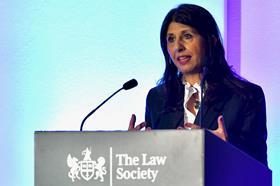The Law Society of England and Wales may be almost 200 years old, but it is focused on developing a modern plan for change and providing the best service to our members, while defending the rule of law and ensuring the British public can access justice.

Earlier this year our board agreed the recommendations of an independent review we commissioned on our communities.
This review found that, among other things, the word ‘Divisions’ is not very inclusive. From today, our communities will become ‘Networks.’
Our four diversity and inclusion (D&I) communities which include our Ethnic Minority Lawyers Division, Lawyers with Disabilities Division, LGBT+ Lawyers Division and our Women Lawyers Division will now be known as our:
- Ethnic Solicitors Network
- Disabled Solicitors Network
- LGBTQ+ Solicitors Network
- Women Solicitors Network
Three of these committees have also made further name changes.
Our Ethnic Solicitors Network has decided to drop the term 'minority.' The committee is of the view that the term is outdated and promotes negative connotations.
The consensus was to keep using the term 'ethnic' as it is the most common and easily identifiable word relating to a race or national group of people.
Meanwhile, committee members of the Disabled Solicitors Network, feel their new name better reflects the Social Model of Disability, which was developed by disabled people and which we support.
This model says that people are disabled by barriers in society and people’s attitudes, not by their impairment or difference.
Not everyone uses the Social Model, just as not everyone will agree with the other networks’ name changes.
How anyone chooses to talk about themselves is up to them, but these changes have been made following consultation with the networks committees, made up of people from the relevant communities.
The LGBTQ+ Solicitors Network agreed that the addition of the Q is designed to be more inclusive.
The inclusion of the ‘Q’ in the acronym LGBTQ+ is frequently used to recognise people who identify as ‘queer’ or ‘questioning’ their sexuality and gender identity.
It is hoped that the changes to community names will ensure the Law Society is able to work closely and collaboratively with even more members.
Networks
Alongside our D&I communities, we’re also making changes to how we support our junior solicitors, small firms, in-house and solicitor judge members.
Today we’re launching our Junior Solicitors Network (JSN), which will replace our Junior Lawyers Division, while our Small Firms Division and In-House Division will now be known as Small Firms Network and in-House Network.
Our Solicitor Judges Division – which supports solicitors who are interested in a judicial career – will now be known as our Solicitor Judges Network.
These changes reflect more fully our approach to inclusivity and collaboration.
The JSN – like the JLD before it – will allow junior solicitors the time and space to tell us about the issues facing them and how the Law Society can support them as they forge their career in the profession.
Throughout the year, the JSN Advisory Committee will help the Law Society formulate plans and deliver against the priorities and issues of junior solicitors.
The committee will also help the Law Society as it refines content for our conference on the Future of Work, suggest speakers for webinars looking at workplace culture and help shape in-person topical seminars and networking held in London, Wales and the regions.
The committee will also work with the Law Society as it influences on legal aid, accessibility of the Solicitors Qualifying Exam and our initiative on 21st century justice.
The Law Society will continue to support and collaborate with the National Junior Lawyers Division (formerly the JLD) and with almost 50 independent local JLDs across England and Wales.
Change across the organisation
Over the past year, we have been making progress on the resources available to our members.
We’ve created and introduced new, informative and easy to access membership and community pages, meaning our members can more easily find information relevant to them and their practice.
In September, we launched our diversity and inclusion (D&I) framework, which serves as a roadmap for workplaces to develop and deliver a strategic approach to D&I.
We also launched our D&I and small firms resource hubs, which have a range of materials including practice notes, online learning, events and the ability to connect with fellow solicitors in those areas all in one place.
Our small firms’ digital community, called Connect, has over 1,500 members, who can discuss issues and topics in a member-only online forum. Later this autumn, we will be launching our in-house peer support digital community too.
On top of all this, we will hold over 50 topical and networking events in London, Wales, online and across the regions in 2022 and 2023.
Standing still is not an option. We strive to provide a valuable service for our members, who do so much to uphold the rule of law and provide access to justice for the public across England and Wales.
Lubna Shuja is president of the Law Society of England and Wales
This article is now closed for comment.































8 Readers' comments